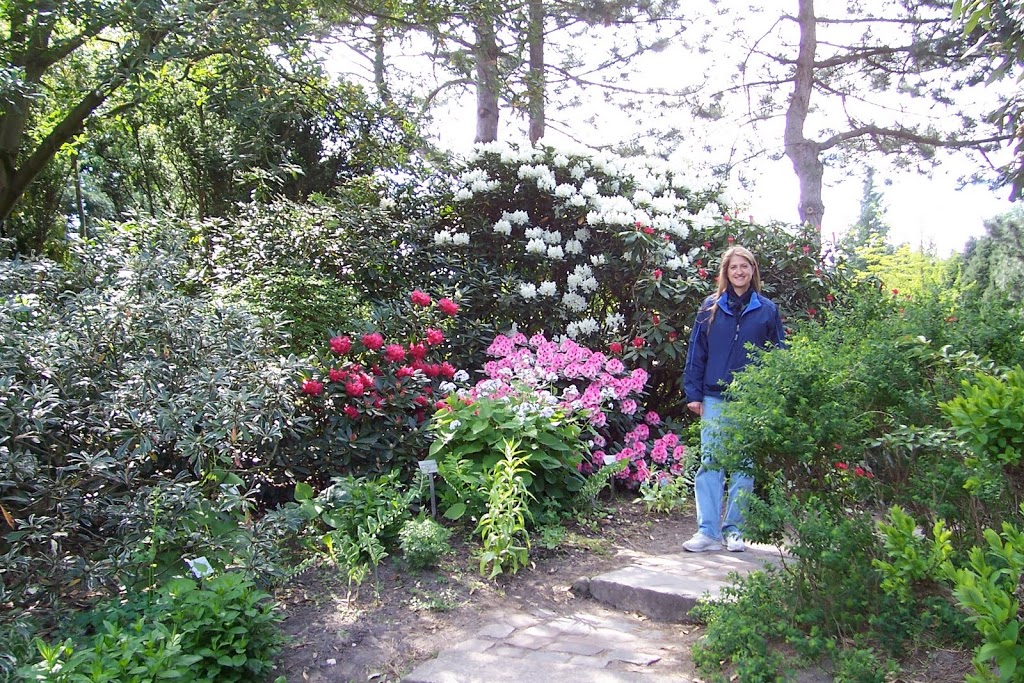In January 2006, when I was doing my internship with Donald Kraybill at the Young Center, I was staying in a little house within walking distance of the YC. On a table in this little house, there was a guest book. Near the end of my six-week internship, I was preparing to leave when I figured it was time to sign my name to it. I opened it, and found there was one name signed… that of Dr. Lucinda Martin in Hamburg, Germany. I stared at those two words, "Hamburg" and "Germany" with disbelief. My plan was to go back home and prepare for my semester abroad in… you guessed it… Hamburg, Germany. I asked Donald for Lucinda's email, and got in touch with her. We agreed to meet once I got to Hamburg.
What a Difference One Connection Can Make, Part I

On a bright and clear winter day, David drove me to Boston for my international flight. It was really strange saying good-bye to David for three whole months, and to go to Europe for the first time without him. I kept looking back to wave one more time, until I had to go through customs, and could not see his royal blue jacket and friendly wave any longer. Then I was on my own.
My flight took me to Zurich, Switzerland and then to Hamburg. By the time I got to Hamburg, I hadn't had a good night's sleep for two nights. In the process of juggling my carry-on bags, I lost my purse. Luckily, I was wearing my passport and other important papers, but I lost the last letter from my mother. The message in the letter was basically cheering me on for going to Germany, and she told it was something she had always wanted to do. This was "clandestine" support, because she would not have let the Amish people know she was doing it. Because she wrote this letter sixteen days before she died, it felt like her parting gift to me. I also lost my address book and other personal items. I had the airline search in the lost and found, but no trace of my purse or its contents was ever found.
A Smith professor met me at the airport and showed me around the Smith Center, and then we boarded the train to Kiwittsmoor, an hour north, where they had finally found a place for me to live. Smith had a regular study abroad program in Hamburg, in which they required the students to live in dorms. Being an Ada Comstock scholar, old enough to be a mother to the other students, posed a problem. At the time in Germany, universities charged no tuition to students. Naturally, some people took advantage of lifelong learning opportunities and stayed in school for a long time. One of the ways the government dealt with that is to put an age limit on people living in dorms… that age was 29. I was 49, so Smith had a hard time finding someone willing to bend the rules to get me into a dorm. As it turns out, they needn't have.
By the time I got to the room that they had bargained so hard for, I was too tired to protest. I needed a place to lay down and sleep. So I showered, made my bed, and crashed. That night I had a nightmare. When I awoke, shivering with fright, I told myself I was in a new place and tried to calm down, but I had a hard time falling asleep again.
When I got up the next morning and I surveyed my boarding situation, I sat down on my bed and cried. I soon met my two roommates… two young men. One was very friendly, the other the opposite. I soon found out that the hostile one made it impossible to use the kitchen without becoming the housemother first, by leaving dirty dishes in the sink in scuzzy water and leaving food to dry out in the cookware. I never cooked a meal there… I had yogurt and granola for breakfast, I ate two meals out, and then came back and slept the night. The hour commute to the University made it nearly impossible to participate in activities at night, so I knew I would feel completely isolated out in Kiwittsmoor. But the worst part of living in that dorm were the vibes. I have never felt so out of place anywhere in my whole life. Then I found out that Fuehlsbuettel, only two train stops before I got off the train, was the site of a center where the Nazis used to experiment with handicapped and gay people. I subsequently had more nightmares, completely out of character for me. I could have counted on one hand the times I had a nightmare in my adult life, and none were as scary as the ones I was having in the dorm. I became aware that it was very possible that the dorm was built on a site where something gruesome had happened.
There was some culture shock in my first weeks in Hamburg. One thing I was not prepared for was the feeling in my gut when I realized I was walking the same ground where those who had been killed or tortured during World War II had walked. It was especially poignant when I came across "stumbling stones" which are brass plates in the cobblestone walkways that mark where someone by the name of _____ lived here and was deported to Fuehlsbuettel (or wherever) on this date ________. In one case, it marked the place where a woman had committed suicide rather than be deported, and she was survived by several children. I would find myself standing in the street, crying for these people I never knew. Of course I knew about the atrocities, long before going to Germany, but from a distance… that, I found out, is not the same as "being there."
Within the first three days of living there, I did what I had to do… I asked the people at Smith for other living arrangements. After a flurry of emails, I was told these were the only accommodations they could make for me. I felt ungrateful when they told me how hard they had worked to find me these accommodations. All the same, I knew I could not live for five months, the last two with David, in that dorm. Because the semester started several months later in Germany than at Smith, I no longer had the option of going back and finishing the semester at Smith. If I went back to the states, I would forfeit my semester… I'd have to pay back all the financial aid I was getting, which I could not afford. I would forfeit the dreams of traveling to the places David and I planned to visit during his stay in Europe. If I quit now, I might not be able to graduate from Smith College. But something had to give — I could not live in that dorm for five months.
Thank goodness for Dr. Lucinda Martin!
To be continued…



sounds like there was definate demonic oppression here. look forward to the rest of the story
Hi Saloma –
I’ve experienced similar things visiting places. I’m looking forward to your next installment.
Blessings,
Susan :)
I’m sure things turned out well , because you lived to write about it. I suppose you did a lot of praying
What a terrible situation to be in, and so far from home. It’s unbelievable that all of the school’s “hard work” to find you a place to live produced such a horrid situation. And to be walking through those camps at the same time…well I can’t wait to see what happens next because it has to be better than this.